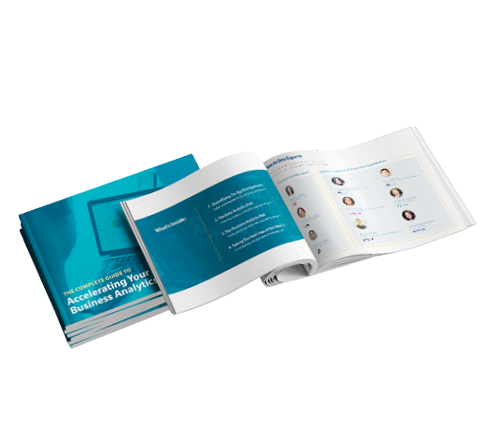Request Information
We're Sorry
There was an unexpected error with the form (your web browser was unable to retrieve some required data from our servers). This kind of error may occur if you have temporarily lost your internet connection. If you're able to verify that your internet connection is stable and the error persists, the Franklin University Help Desk is available to assist you at helpdesk@franklin.edu, 614.947.6682 (local), or 1.866.435.7006 (toll free).
Just a moment while we process your submission.

What Can You Do With a Data Science Degree?
In today's fast-paced and ever-changing world, data rules supreme. Successful conglomerates across the globe use data to shape decisions and strategies— and they need data fluent professionals to decipher the stories that data tells. If you’ve ever felt like the ads in your social feed are two steps ahead of you— the answer isn’t mind reading, it’s data science.
Data science as a field is growing exponentially, creating more jobs and opportunities every year. The demand for data experts is at an all-time high, so what are you waiting for? If you're interested in a career that combines technology, analytics and innovation, then data science might be your calling.
What is Data Science—And Why is it Important?
Data science is not just about interpreting data; it's about turning raw data into actionable insights. It involves the process of collecting, cleaning, analyzing and interpreting vast sets of data to make informed decisions. In short, data experts are the modern-day alchemists turning raw data into gold for businesses.
Global companies such as Amazon, Netflix and American Express are constantly leveraging data science to gain a competitive edge. They harness the power of Big Data to excel in their respective markets and rely heavily on data teams and leaders to uncover insights and make data-driven decisions that can contribute to their continued success.
For example, consider Amazon. The e-commerce giant uses data science to recommend products, optimize its supply chain and forecast demand for certain items. If you buy a coffee maker on Amazon, the site is instantly going to recommend things like filters, ground coffee and mugs. Similarly, Netflix uses data science to suggest movies and TV shows you're likely to enjoy, keeping you engaged and subscribed. If you’re known to enjoy a good horror movie, Netflix continues recommending that genre. The more content you discover and consume, the more Netflix succeeds.
Dr. Nimet Alpay, Ph.D., program chair of M.S. in Data Analytics at Franklin University, describes data as "the fuel of decision-making in business" and posits that "data and analytics are being used in almost every field." Countless professionals agree that success in today's business environment requires the ability to think data-analytically.
Get a FREE roadmap that includes insider information to help you maximize the many opportunities in the fast-growing field of Big Data.
What can you do with a Data Science Degree?
A data science degree is a gateway to a world of opportunities. With the data-driven landscape continuing to expand, there has never been a better time to embark on this exciting and rewarding career path. Whether you're interested in Big Data, predictive analytics, machine learning or data engineering, a data science degree equips you with the skills to thrive in a rapidly evolving job market.
Earning a degree in data science can help you hone the skills needed for data-focused careers, including data visualization, Big Data systems and processes, and help you gain familiarity with data analysis tools, like Python and R.
A data science degree can also help open doors to a myriad of job opportunities and empower you to navigate the world's data-driven landscape. And that landscape is an area ripe with opportunity and potential growth.
How much growth? In the past five years over 2.5 million job postings were created for data science professionals, according to Lightcast, a leading labor analytics firm. The U.S. Bureau of Labor Statistics, meanwhile, estimates that a career in data science can yield a median salary of $103,500.
Jobs & Career Opportunities for Data Science Majors
Career opportunities in data science are diverse, with various avenues to explore in the field that don’t show signs of slowing.
According to the Bureau of Labor Statistics, data science roles are projected to grow 136% in the next 10 years, which is above average for other fields. Specific jobs in the data science field— financial analysts, computer and information research scientists, database administrators, actuaries and data scientists— are projected to grow 42% according to Lightcast. This demand reflects the increasing significance of data in our lives.

As you explore the data-science job market, you'll encounter a wide array of roles, including but not limited to:
- Financial analysts guide business and individuals in decisions regarding investing money to earn profit — these professionals earn an average income of $96,220 per year and are projected to grow 8% in the next 10 years, which is faster than average.
- Data scientists use analytical tools and techniques to extract meaningful insights from data and earn around $103,000 annually. The job outlook shows an estimated 35% job growth from 2022 to 2032.
- Database administrators and architects create or organize systems to store and secure data and earn more than $112,000 a year, with the job outlook showing an 8% growth rate in the next decade.
- Actuaries use statistics, mathematics and financial theory to analyze the economics costs of risk and uncertainty. Actuaries earn $113,990 annually and are expected to grow 23% by 2032.
- Computer and information research scientists design innovative uses for new and existing computing technology, earning an average income of $136,620 annually with an estimated job growth rate of 23% by 2032.
These are just a few examples of the abundance of career paths accessible by a data science degree. The beauty of data science lies in its versatility.

Your Path Forward: Explore Franklin University’s B.S. in Analytics-Applied Data Science
Within our data-centric world, data scientists and those who understand data play a crucial role. Pursuing a data science degree broadens your horizon on a global scale and provides multiple opportunities spanning many industries, giving you the skills needed to excel in a continually evolving job market. Franklin University's B.S. in Analytics-Applied Data Science program emerges as a pathway to success.
Earning a degree in data science enables you to apply analytics to real-world issues, develop, manage and optimize data systems and attain proficiency with indispensable tools like SQL, Python, R and Tableau. With Franklin University's support through 100% online classes and expertise of faculty, you are well-equipped to confront the challenges and prospects of a world driven by data, securing a promising future in this ever-expanding field.





